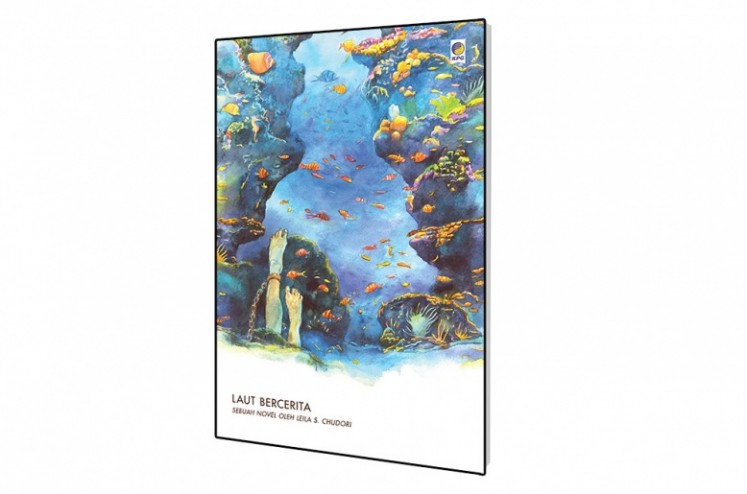Popular Reads
Top Results
Can't find what you're looking for?
View all search resultsPopular Reads
Top Results
Can't find what you're looking for?
View all search resultsLeila S. Chudori’s evolving journey
A new novel digs deep into the story of a student activist kidnapped during the political turmoil of 1998.
Change text size
Gift Premium Articles
to Anyone
“Try to count them, I dare you,” Tempo veteran journalist and author Leila S. Chudori responded in protest over an assertion that fictional stories on the 1965 coup and subsequent killings of members and sympathisers of the Indonesian Communist Party (PKI) were trending.
“People said there were many such novels, but the truth is, out of 500 or 600 novels published in a year, only a small part focuses on the 1965 [tragedy],” Leila said in Canberra recently.
Leila, who has just launched another book Laut Bercerita (The Sea Speaks His Name), recently visited Australia to discuss her latest work in sessions at the University of Melbourne’s Indonesia Forum and Australian National University’s Indonesia Project. Previously, she published the award-winning novel Pulang (Homecoming), which focuses on the human impact of the 1965-1966 killings and their aftermath.
“What makes them stand out is the fact that those books were well written and thus gained wide exposure,” she added.
Leila gave credit to fellow authors like Laksmi Pamuntjak (Amba) and Eka Kurniawan (Beauty is a Wound) and to a more senior author, Ahmad Tohari (The Dancer), for publishing well-written books with the 1965 killings as the background. She further mentioned the influential works of filmmaker Joshua Oppenheimer, The Act of Killing and The Look of Silence, and the digital community movement Ingat65 (Remember 65) — all of which have collectively broken the silence and ignorance on the issue in recent years.
“They are all well-written and thought-provoking,” she said.
But provoking discussion and shattering the status quo were not her main motive in choosing periods of political significance as the universe for her characters and stories. In Laut Bercerita, Leila follows the character of Biru Laut, a student activist who was kidnapped and eventually went missing in 1998, a few months prior to the downfall of Soeharto. The second half of the novel shifts the perspective to Asmara Jati, Laut’s younger sister, who, along with other family members of kidnapped student activists, struggled to put the pieces of the puzzle together and find answers to their never-ending questions.
“My forte has always been family stories. Politics, history, cuisine are all backdrops,” she said, denying that she aimed to specialize on historical novels.
Despite their importance in the arts, popular works shedding light on sensitive issues like the 1965-1966 killings or forced disappearances in the late 1990s might not necessarily change things at the elite level.
Leila said some of the people, who had been involved in those tragedies, were in the government, adding that, unfortunately, the current politicians were cautious in handling the issues, although they were not connected to it in the past.
“But most civilians have minimal knowledge of the issue. Furthermore, the perpetrators are still über-sensitive [in speaking up about and acknowledging the past atrocities].”
Laut Bercerita (The Sea Speaks His Name) by Leila S. Chudori (Penerbit KPG/File)While doing research for her work, Leila encountered various kinds of characters and had to listen to their struggle in coping with the sorrow from pondering unanswered questions.
“I interviewed so many people for Pulang and Laut Bercerita. The hardest thing for me was to listen to them sharing their grief: the torture they suffered, the longing of parents whose children had been kidnapped and so on. It was very difficult to listen to that,” Leila recalled.
She finds the experience worthwhile.
“Though fictional, Laut Bercerita was inspired by true stories of the victims, survivors and their families [...] As a journalist I can also write pieces on this issue, but still, our spaces are limited. [As an author] I want to create a totally different universe, which allows me and the readers to understand and interact with these characters,” she said.
Danang Widoyoko, former student activist and former coordinator of Indonesia Corruption Watch (ICW), seconded the importance of fictional work inspired by historical political events in Indonesia.
“A novel enlivens a story. The 1998 political event is widely understood as the year when Soeharto stepped down. But the novel tells the story of a character, of his father, his girlfriend, his life before activism and so on. It complements history textbooks.
“Some social scientists argue that elite dispute was the driver of the regime’s downfall, which is true, but it wouldn’t have happened if it wasn’t for student-led rallies. Without large-scale protests, Ginanjar wouldn’t have resigned from his post, and Harmoko wouldn’t have turned his back on Soeharto,” Danang said, referring to former ministers Ginandjar Kartasasmita and Harmoko, who served in the last cabinet of the Soeharto regime.
He said the large rallies also didn’t just happen like that — they were the culmination of small-scale rallies and prolonged student activism across the country.
“In academia, elite dispute is the dependant variable. In the novel, the dependant variable is student activism,” Danang added, highlighting the difference between scholarly and fictional work.
Following her latest book, Leila will push herself to the limit for her next projects.
“My next work will focus on a culinary theme,” she said with a chuckle. “But don’t think it will be a happy-go-lucky story. It’s going to be a sad story,” she added.
Leila also shared her excitement for her next big projects.
“My long-term projects will include [writing] a prequel to Pulang and another historic novel that centers on a fictional kingdom during the Hindu period of Nusantara. I want to explore wayang and the society during that period — their lifestyle and so on,” she said.












